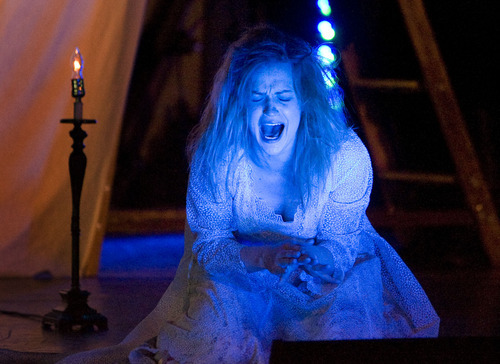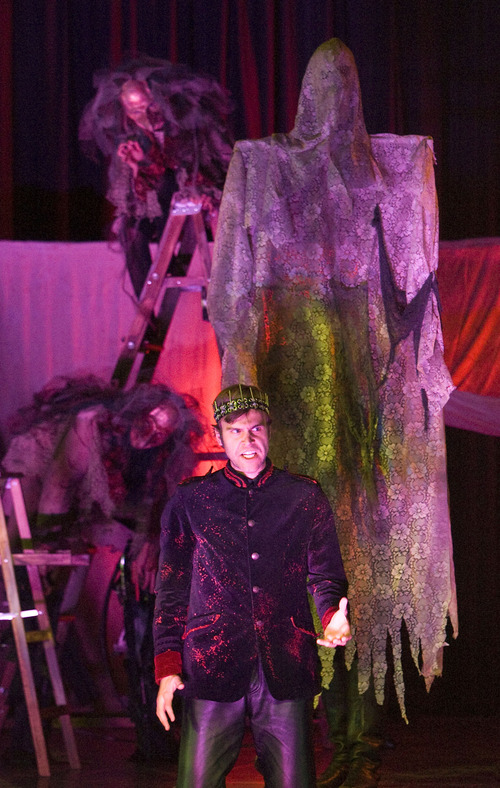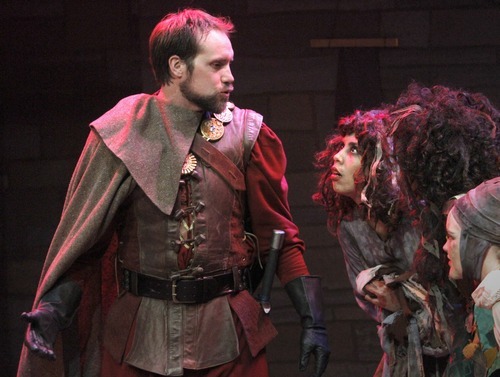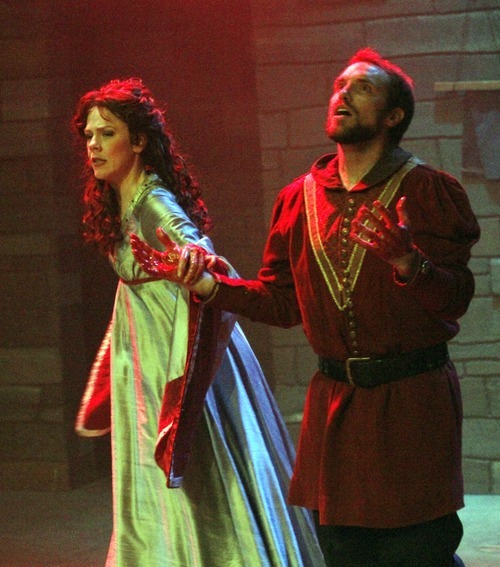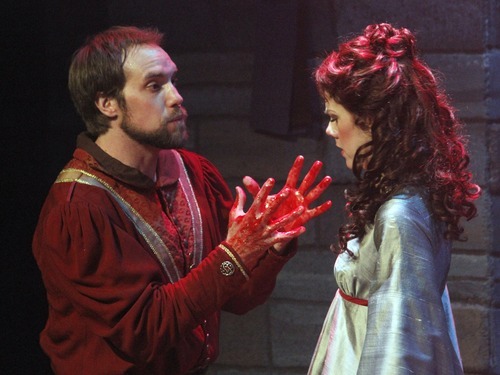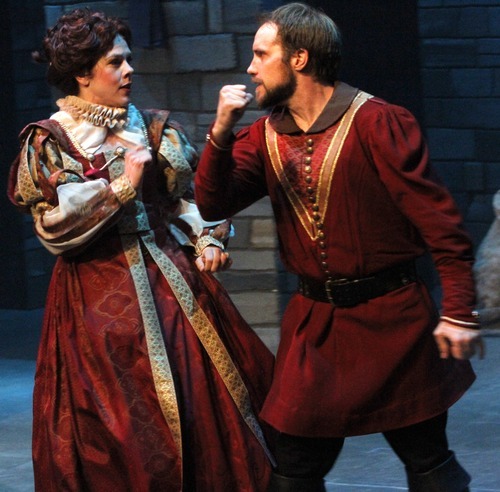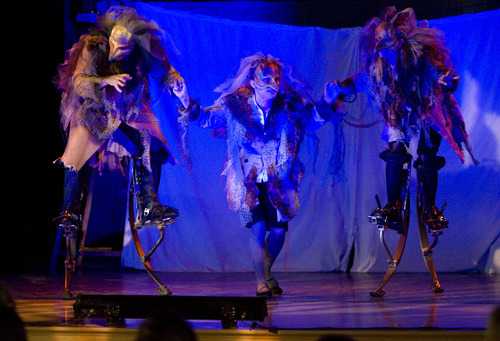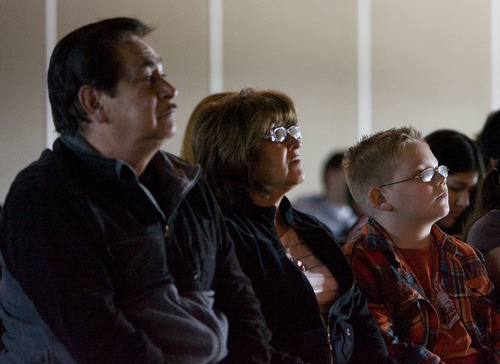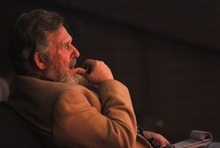This is an archived article that was published on sltrib.com in 2011, and information in the article may be outdated. It is provided only for personal research purposes and may not be reprinted.
Power corrupts. Power, combined with conniving neighborhood witches or "weird sisters," corrupts absolutely.
For centuries, the story of "Macbeth" has served as the ultimate drama of unchecked ambition. So of course the classic political tragedy remains relevant in a year when Middle East dictators resort to bloodshed to preserve power, and the hope of political reform at home turns cynical.
The parallels are obvious, says Christopher Clark, assistant professor of theater at Utah Valley University who directed the Utah Shakespeare Festival's Shakespeare in the Schools touring production.
"The play shows us how power and violence are intertwined," Clark said. "Now thanks to current events, we know what a dictatorship means in the context of this play. People come into power with the promise of a better life, and then they turn into their predecessors. It's a cycle."
For Peder Melhuse, director of the University of Utah's student production at the Babcock Theatre (which opens Friday, April 8, and runs through April 17), the story's most enduring appeal is its atmosphere of dread. The witches make the show. "[Macbeth] keeps coming back to them," Melhuse said.
—
A tale of creeping, and creeped-out, power • The first, most obvious, difference between the student and touring productions is the number of witches in the casts.
With 10 witches, the Babcock Theatre invites an entire coven onstage. USF's touring production, by contrast, fulfills the Bard's bare minimum of three.
Regardless of number, of course, the Thane of Cawdor gets his inevitable comeuppance.
"King Lear" may be the tragedy treasured by parents who know the heartbreak of children gone wrong. "Othello" may be the favorite of adolescents tuning their romantic instincts to the pull of jealousy. But theatergoers of any age seem to have little problem understanding the allure of social climbing that bewitches Macbeth.
That, plus the play's bracing immediacy free of Shakespeare's familiar use of subplots, makes it a favorite of educators, said Joshua Midgett, tour manager of Utah Shakespeare Festival's Shakespeare in the Schools production. By the end of its run late this month, the USF cast assembled from national auditions will have performed "Macbeth" to more than 35,000 people, mostly students, in Utah, Nevada, Arizona and Wyoming. The show has played at a variety of venues, ranging from schools and community centers to prisons.
At the U., Melhuse, a professor in the Actor Training Program, said he's long wanted to direct a production that emphasized the role of witches in Macbeth's demise. So he's turned the caldron's steam up to 11 and makes room in the script for an almost jazzlike witches' dance.
"The only thing more I could wish for is a rotating stage," Melhuse said. Instead, the production employs a tree as a stage prop that serves as something of home base for all those witches.
—
"Macbeth," micro and macro • The festival's touring production presents a streamlined production, with a cast of seven. That includes cellist Jennifer Chandler, who composed a solo score for every scene. She even puts down her instrument to play a daughter of King Duncan and other minor parts.
The festival cast has played stages of virtually every shape and size during its Utah tour. With every new venue, the cast conduct small run-throughs to accustom themselves to new acoustics.
The touring show's minimal set — labeled a "garden shed" design by the director — depicts some of the play's bloodiest scenes through drapes of laundry sheets hung on stepladders. The aesthetic suggests that anyone interested in Shakespeare's classic stories could mount a production without benefit of a grand-size stage and even more grandiose props. Some of the props, particularly the ladders, also symbolize the play's various themes, such as the climbing nature of ambition.
Art Romo, who attended the show at the Utah Cultural Celebration Center last week, remembered seeing the play during his elementary-school days in Taos, N.M. He appreciated the opportunity to share the same experience with his grandchildren, Christian Romo, 10, and Christian's older sister, Aliya.
"I didn't understand all the language when I first saw it at their age, but I understood its power, and the play for power behind the story," Romo said.
—
The blood of realism • If theatergoers don't understand all the nuances of Shakespeare's language at Babcock, the production's simple set design shouldn't be a stumbling block.
The USF production plays Macbeth's downfall as swift, sharp and nimble. In contrast, the vision of the Babcock's production is of a man slogging through the quicksand of foggy castle walls. In complicated battle scenes, the witches are employed to carry bodies off stage and even wipe blood off the floors.
The cast benefited from the skills of fight choreographer Ken Merckx, who was flown in from Los Angeles to help stage the battle scenes.
If realism counts, Babcock's production is by far bloodier. The USF touring production crafts the scene of Banquo's ghost with inventive use of scarlet rags hanging from eyes, pouring from open wounds and pulled out of actors' guts. At Babcock, in the climactic scene, theater fake blood runs and splatters all over the characters and the floor.
Despite the staging differences, both productions evoke visceral reactions from inexperienced and experienced theatergoers.
Aaron Gaines, a New York City-based actor who plays the lead role in the USF show, said he's struck by how various audiences react to the play's ferocity.
"We see so much violence on television and the media that people don't really question it in that context," Gaines said. "It's a lot more jarring when it's right in front of them."
University of Utah's 'Macbeth'
When • April 8-10, 13-17, 7:30 p.m., with 2 p.m. matinee April 16
Where• Babcock Theatre, downstairs at Simmons Pioneer Memorial Theatre, 240 S. 1500 East, University of Utah campus, Salt Lake City
Info• $7-$13. Call 801-581-7100 or visit http://www.theatre.utah.edu.
Utah Shakespeare Festival's touring 'Macbeth'
When • Monday, April 11, 7 p.m.; Wednesday, April 20, 7 p.m.
Where • Olympus Junior High School, 2217 Murray Holladay Road, Holladay; Delta High School, 50 W. 300 North, Delta
Info • Free April 11 performance; $6 April 20 performance. Call 435-865-8333 or visit http://www.bard.org/education/tour.html for more information and additional shows.


